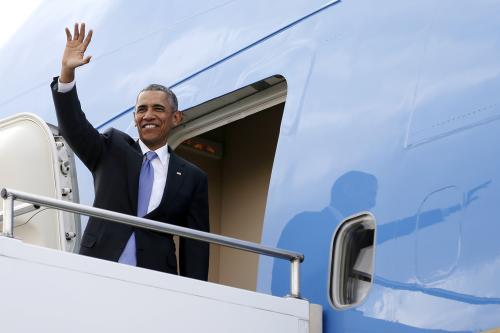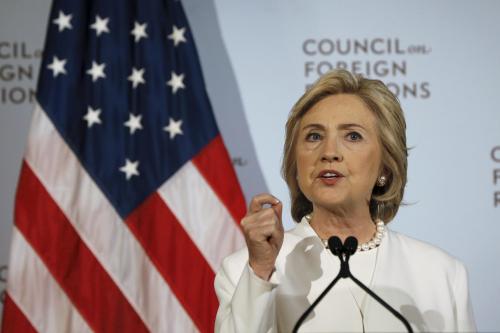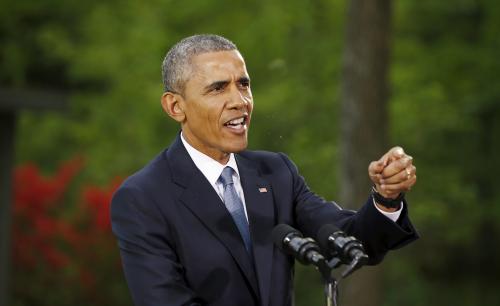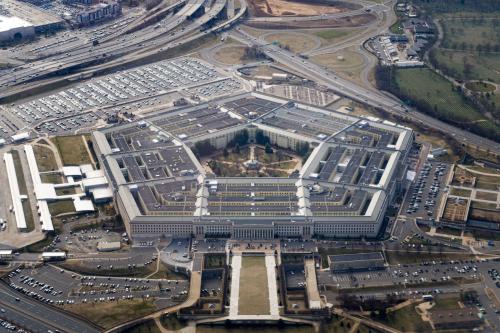President Obama is talking entrepreneurship again. This is very good news—but only if he means it.
In his speech last week before the U.N. General Assembly, the President addressed “the cancer of violent extremism that has ravaged so many parts of the Muslim world.” It is a mess, arguably more dangerous to the US than anything since 9/11.
But there, not quite buried in Obama’s fourth and final action point for dealing with the extremism crisis, was a true solution: “The countries of the Arab and Muslim world must focus on the extraordinary potential of their people—especially the youth.”
The President’s formula here included a large dose of entrepreneurship. He reminded us that the Muslim world is full of examples of youth thriving in societies that embrace innovation. He cited Malaysia, a Muslim-majority country, as an example of an economy that has leveraged entrepreneurship for impressive growth. And, he said, the U.S. government “will expand our programs to support entrepreneurship, civil society, education and youth—because, ultimately, these investments are the best antidote to violence.”
President Obama is right that entrepreneurship is a powerful antidote to violence. Entrepreneurship is a job-creating machine, and jobs provide the growth and economic hope that are the foundation of peaceful, civil societies. In the U.S. it is our youngest firms, not our established companies, that account for net job growth. The same is true in fragile and developing states, where small- and medium-sized businesses predominate. But, as Obama pointed out, shudderingly huge numbers of young people in the Middle East and North Africa do not have jobs—youth unemployment rates can exceed 35 percent—and it is these young men, disillusioned and frustrated, who are drawn to extremism.
So what better way to confront the core causes of violent extremism than promoting entrepreneurship? As a former Senior Advisor for Entrepreneurship in Hillary Clinton’s State Department—and, more importantly, as both a successful and unsuccessful entrepreneur—I am convinced that supporting the innovators and job creators of the Muslim world is our best bet. We can chase ISIS, al-Qaeda, the Khorasan group, Boko Haram, al-Shabaab, Hamas, AQIM, and whoever else all over the globe for a very, very, very long time. But the fact will remain that a virtually limitless supply of desperate, unemployed young men in shaky states will sit around with nothing to do but bad stuff— until truly viable economic opportunities present themselves. Those opportunities will come, at least in part, through entrepreneurship.
What we need today is a commitment to those “programs to support entrepreneurship” that Obama mentioned at the U.N. last week. This commitment must be true and unyielding because, worryingly, we have heard this tune before, with less than stellar follow-through.
In 2009, in Cairo, Obama delivered his important “New Beginning” speech, describing a “broader engagement” with the Muslim world—one that went beyond oil and terrorism to one that included entrepreneurship. Then, he announced a Presidential Summit on Entrepreneurship to gather innovators from Muslim-majority countries, and he promised to send “science envoys” and launch technology funds, among other “Cairo Initiatives.” Following that speech, there was enthusiasm—and lip service—around promoting entrepreneurship, including Obama’s hosting of that first entrepreneurship summit. (The fifth iteration will occur in November in Morocco.)
Alas, the programs and funding envisioned in the Cairo speech barely came to fruition and we have not seen a sustained, comprehensive U.S. government effort towards the promotion and support of Muslim entrepreneurs since.
Let us hope that things are different this time. The entrepreneurship that excites us here at home is bolstered by ecosystems of incubator programs, business plan competitions, university courses, venture capital firms, mentorship networks, and (like it or not) Shark Tank. All this good stuff gives both Silicon Valley startups and non-tech entrepreneurs more than a fighting chance of scaling up and creating jobs. By investing in similar ecosystem programs in the Middle East, the U.S. government will do a lot better than spending trillions of dollars and hundreds of thousands of lives on wars—at pennies on the $100 bill.
Entrepreneurship is very much a powerful tool for peace in the very regions of the world that breed threats to America today. It is something Americans are good at, and something people around the world admire us for, even those who like us least. Bonus: no one gets killed; they get jobs instead. If the U.S. government can put money where Obama’s mouth was last week, we will take an important step to confronting the core causes of violent extremism.
The Brookings Institution is committed to quality, independence, and impact.
We are supported by a diverse array of funders. In line with our values and policies, each Brookings publication represents the sole views of its author(s).







Commentary
Fighting ISIS with Entrepreneurship
October 7, 2014